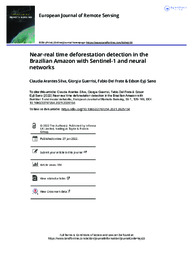Near-real time deforestation detection in the Brazilian Amazon with Sentinel-1 and neural networks.
Near-real time deforestation detection in the Brazilian Amazon with Sentinel-1 and neural networks.
Author(s): SILVA, C. A.; GUERRISI, G.; DEL FRATE, F.; SANO, E. E.
Summary: Optical-based near-real time deforestation alert systems in the Brazilian Amazon are ineffective in the rainy season. This study identify clear-cut deforested areas through Neural Network (NN) algorithm based on C-band, VV- and VH-polarized, Sentinel-1 images. Statistical parameters of backscatter coefficients (mean, standard deviation, and the difference between maximum and minimum values ? MMD) were computed from 30 Sentinel-1 images, from 2019, used as input parameters of the NN classifier. The samples were manually selected, including forested and deforested areas. After deforestation, mean backscatter signals decreased on the average of 2 dB for VV and 2.3 dB for VH from May to September?October. A Multi-Layer Perceptron (MLP) network was used for detecting near-real time forest disturbances larger than 2 ha. Case studies were performed for both polarizations considered the following input sets to the MLP: mean; mean and standard deviation; mean and MMD; and mean, standard deviation, and MMD. For the 2019 dataset, the latter showed the best performance of the NN algorithm with accuracy and F1 score of 99%. Automatic extraction using 2018 Sentinel-1 images reached accuracy and F1 score of 89% with the MapBiomas reference data and accuracy of 81% and F1 score of 79% with the PRODES reference data.
Publication year: 2022
Types of publication: Journal article
Unit: Embrapa Cerrados
Observation
Some of Embrapa's publications are published as ePub files. To read them, use or download one of the following free software options to your computer or mobile device. Android: Google Play Books; IOS: iBooks; Windows and Linux: Calibre.
Access other publications
Access the Agricultural Research Database (BDPA) to consult Embrapa's full library collection and records.
Visit Embrapa Bookstore to purchase books and other publications sold by Embrapa.

